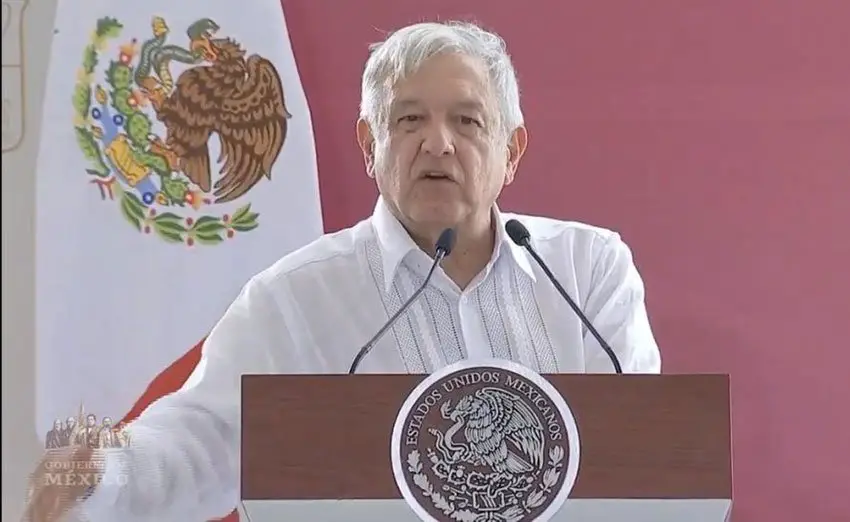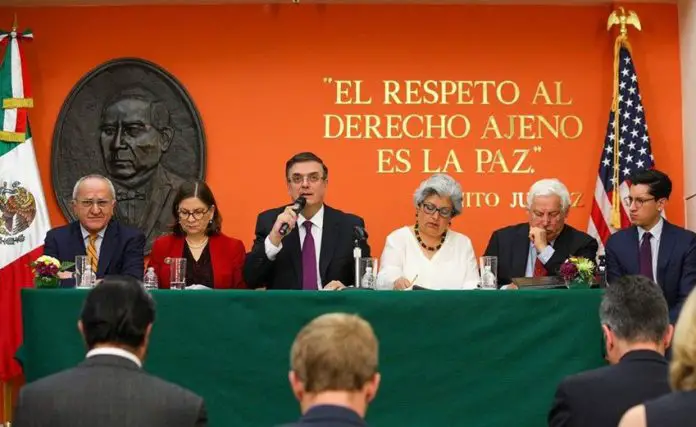Another day, another Twitter tirade by the United States president to malign Mexico.
Three days after announcing that he was placing a 5% tariff on all goods from Mexico to pressure the country to do more to stop the movement of undocumented migrants across its northern border, Donald Trump yesterday labelled Mexico “an abuser of the United States” and declared that “we want action, not talk” to solve the “border crisis.”
Referring to the contingent of Mexican officials led by Foreign Secretary Marcelo Ebrard that has traveled to Washington to meet with United States representatives this week, Trump wrote:
“Mexico is sending a big delegation to talk about the border. Problem is, they’ve been ‘talking’ for 25 years. We want action, not talk. They could solve the border crisis in one day if they so desired. Otherwise, our companies and jobs are coming back to the USA!”
The U.S. president sent a similar message in an earlier two-part tweet.
Mexico is sending a big delegation to talk about the Border. Problem is, they’ve been “talking” for 25 years. We want action, not talk. They could solve the Border Crisis in one day if they so desired. Otherwise, our companies and jobs are coming back to the USA!
— Donald J. Trump (@realDonaldTrump) June 2, 2019
“People have been saying for years that we should talk to Mexico. The problem is that Mexico is an ‘abuser’ of the United States, taking but never giving. It has been this way for decades. Either they stop the invasion of our country by drug dealers, cartels, human traffickers . . . coyotes and illegal immigrants, which they can do very easily, or our many companies and jobs that have been foolishly allowed to move south of the border will be brought back into the United States through taxation (tariffs). America has had enough!”
Trump then turned his ire to another of his favored punching bags.
“The wall is under construction and moving along quickly, despite all of the radical liberal Democrat lawsuits. What are they thinking as our country is invaded by so many people (illegals) and things (drugs) that we do not want. Make America Great Again!”
Facing his biggest foreign policy test since taking office six months ago, President López Obrador yesterday chose to take a diplomatic path to respond.
“The government of Mexico is a friend of the government of the United States. The president of Mexico wants to continue to be a friend of President Trump. Mexicans are friends of the United States people. To them I say from Paraíso, [Tabasco]: Let us vow that nothing or nobody will divide our beautiful and sacred friendship,” he wrote on Twitter.
López Obrador said he didn’t want confrontation and does not believe in “a tooth for a tooth” and “an eye for an eye.”

Although he told Trump in a letter last week that Mexico was doing all it can to “avoid” the flow of migrants through Mexico he suggested on Saturday that migration controls could be tightened further, adding that he expected “good results” from this week’s bilateral talks.
“The main thing is to report on what we’re already doing on the migration issue, and if it’s necessary to reinforce these measures without violating human rights, we could be prepared to reach that deal,” López Obrador said.
Mexican officials are expected to present statistics in Washington that show that arrests and deportations of migrants in Mexico have increased in recent months.
However, counteracting those statistics is United States data that shows that arrests of undocumented migrants in the U.S. surged to over 90,000 in both March and April.
Still, López Obrador stressed that “we’re not going to get into a trade war, a war of tariffs and of taxes.”
If the United States goes ahead with the application of the new tariffs, the president said that his government has a “plan” although he didn’t provide any details.
But he did say that Mexico reserved the right to seek international legal arbitration to solve the dispute.
Some business groups, among them Mexico’s leading farm lobby, urged the government to retaliate against any tariffs imposed by Trump, as occurred last year when the United States implemented duties on steel and aluminum.
The threat of the new universal tariff quickly caused stocks, oil prices and the peso to fall, and there is speculation that the tariffs could derail the ratification process for the new North American trade deal.
